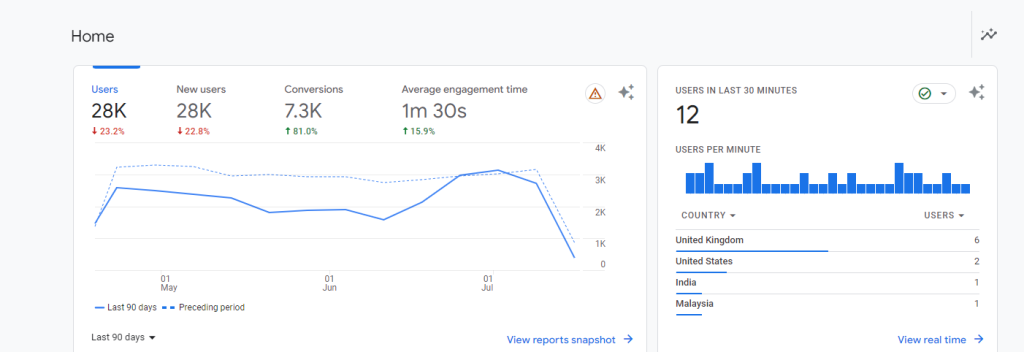Table of contents
SEO Analytics
In the ever-evolving landscape of digital marketing, search engine optimization (SEO) plays a vital role in driving organic traffic and improving online visibility. While implementing SEO strategies is crucial, it is equally important to track and measure the success of these efforts. This is where SEO analytics comes into play. By leveraging data and metrics, SEO analytics empowers website owners and marketers to gain valuable insights, identify opportunities, and optimize their SEO strategies for better results. In this blog, we will explore the importance of SEO analytics and discuss effective methods to track and measure the success of your SEO efforts.
1. Defining SEO Analytics:
SEO analytics involves the collection, analysis, and interpretation of data related to website performance and organic search traffic. It provides valuable information about user behavior, keyword rankings, website visibility, and other essential metrics. By understanding SEO analytics, you can make data-driven decisions to improve your website’s search engine rankings and overall performance.
2. Setting Up Analytics Tools:
To begin tracking your SEO efforts, it is crucial to set up analytics tools such as Google Analytics or other SEO-specific platforms. These tools provide comprehensive insights into website traffic, user behavior, referral sources, and much more. By properly configuring and integrating these tools, you can gather accurate data that will help you measure the effectiveness of your SEO strategies.

3. Key SEO Metrics to Monitor:
a. Organic Traffic: Monitor the number of visitors coming to your website through organic search results. This metric reflects the success of your SEO efforts in driving relevant traffic.
b. Keyword Rankings: Track the positions of your target keywords in search engine result pages (SERPs). Improvements in keyword rankings indicate that your SEO strategies are working effectively.
c. Click-Through Rate (CTR): Measure the percentage of users who click on your website’s link when it appears in search results. A higher CTR signifies that your website is attracting user attention and standing out from competitors.
d. Bounce Rate: Monitor the percentage of users who leave your website after viewing only one page. A lower bounce rate indicates that users find your content engaging and relevant.
e. Conversion Rate: Track the percentage of visitors who take desired actions on your website, such as making a purchase, filling out a form, or subscribing to a newsletter. Monitoring conversion rates helps assess the impact of SEO on business goals.
4. Analyzing Data and Identifying Insights:
Regularly analyze the data collected from your analytics tools to identify trends, patterns, and insights. Look for pages with high organic traffic, keywords driving the most visits, and content that resonates with your target audience. Identify areas where you can optimize your website further, such as improving page load times, enhancing user experience, or targeting new keywords.

5. A/B Testing and Experimentation:
Use SEO analytics to conduct A/B tests and experiments to determine the impact of specific changes on your website. Test variations of meta tags, page layouts, or content formats to see which elements yield better results. Continuously refine your SEO strategies based on the insights gained from these experiments.
6. Regular Reporting and Goal Tracking:
Create regular reports to monitor and communicate the progress of your SEO efforts. Track key metrics, set achievable goals, and assess your performance against these objectives. Regular reporting helps you understand what is working and what needs improvement, allowing you to adjust your strategies accordingly.
Conclusion:
SEO analytics is a powerful tool for tracking and measuring the success of your SEO efforts. By leveraging data and metrics, you can gain valuable insights into user behavior, keyword rankings, and website performance. With this information, you can refine your strategies, optimize your website, and achieve better search engine rankings and organic traffic. Remember, the key to effective analytics is a combination of consistent tracking, thorough analysis, and data-driven decision-making. Embrace the power of SEO analytics, and watch your website thrive in the competitive online landscape.
Readout : On-Page SEO Strategies: Optimizing Your Website for Search Engines
FAQ’s
SEO analytics involves collecting and analyzing data to measure the success of your SEO efforts. It provides insights into user behavior, keyword rankings, and website performance. By tracking and analyzing this data, you can make data-driven decisions to improve your SEO strategies and achieve better search engine rankings and organic traffic.
To set up analytics tools, you can use platforms like Google Analytics or other SEO-specific tools. Configure and integrate these tools with your website to gather accurate data. Set up goals, track conversions, and monitor key metrics such as organic traffic, keyword rankings, click-through rates, bounce rates, and conversion rates.
SEO analytics insights can help you identify trends, patterns, and areas for improvement. Optimize your website by improving page load times, enhancing user experience, targeting new keywords, and creating engaging content. Conduct A/B tests and experiments to test variations and refine your strategies based on the insights gained from the data. Regularly track and report on your SEO performance to measure progress and adjust your strategies accordingly

Author Disclaimer
My Self is Smith, I am an experienced SEO professional and a passionate writer specializing in all aspects of Search Engine Optimization. With years of hands-on experience in managing SEO and optimizing product performance, I have honed my expertise in understanding google algorithms, policies, and best practices.
My extensive knowledge of the intricacies of SEO platform empowers me to provide valuable insights, strategies, and practical advice through my blogs. I have helped numerous websites enhance their website ranking, increase visibility, and drive sales on websites
Rest assured that my content is based on factual information, research, and personal experiences. I stay up-to-date with the latest SEO trends, Google Updates updates, and strategies, ensuring that my blogs are always relevant and accurate.
Whether you are a beginner seeking guidance or an experienced seller looking to fine-tune your SEO Strategies my articles are designed to empower you with actionable steps and insider tips. Trust me as your go-to resource for SEO -related content, and let’s navigate the world of e-commerce ,SEO together.


